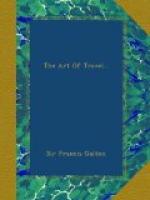Dipping clothes wetted with rain, in Sea-water.—Captain Bligh, who was turned adrift in an open boat after the mutiny of the ‘Bounty,’ writes thus about his experience:—“With respect to the preservation of our health, during a course of 16 days of heavy and almost continual rain, I would recommend to every one in a similar situation the method we practised, which is to dip their clothes in the salt water and wring them out as often as they become filled with rain: it was the only resource we had, and I believe was of the greatest service to us, for it felt more like a change of dry clothes than could well be imagined. We had occasion to do this so often, that at length our clothes were wrung to pieces; for except the few days we passed on the coast of New Holland, we were continually wet, either with rain or sea.”
Washing Clothes.—Substitute for Soap.—The lye of ashes and the gall of animals are the readiest substitutes for soap. The sailor’s recipe for washing clothes is well known, but it is too dirty to describe. Bran, and the meal of many seeds, is good for scouring: also some earths, like fuller’s-earth. Many countries possess plants that will make a lather with water. Dr. Rae says that in a very cold climate, when fire, water, and the means of drying are scarce, it will be found that rubbing andbeating in snow cleanses all clothing remarkably well, particularly woollens. When preparing for a regular day’s washing, it is a good plan to boil an abundance of ashes in water, strain off the lye, adding the gall of any animal you may have killed, and let the clothes soak in it. Next morning, take them to the water-side, and wash and beat them with a flat piece of wood, or lay them on a broad stone and knead and wring them with the hands.
Lye of Ashes.—In choosing plants to burn for ashes (whence the lye is to be made by pouring hot water on them), it must be recollected that all plants are not equally efficacious: those that contain the most alkali (either potash or soda) are the best. On this account, the stalks of succulent plants, as reeds, maize, broom, heath, and furze, are very much better than the wood of any trees; and twigs are better than timber. Pine and fir-trees are the worst of woods. The ashes of most kinds of seaweed yield abundance of alkali. Potash is the alkali that is obtained from the ashes of land plants, and soda from those of marine plants.
10,000 parts of pine or fur.......contain.... 4 parts of alkali. " poplar " 7 " " beech-wood " 14 " " oak " 15 " " willow " 28 " " elm, maple, and wheat straw. " 39 " " thistles, flax-stems, and small rushes " 50 " " large rushes " 72 " " stalk of maize " 175 "




